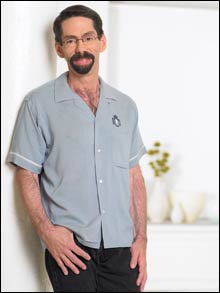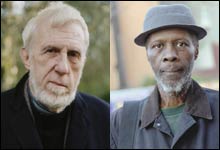 Twenty years ago, Fred Hersch was known as a talented young jazz pianist and teacher at New England Conservatory. But he was even better known for his unusual status in the jazz world: an openly gay man with HIV. Hersch has worked hard, and in the intervening years he’s established a reputation larger than his illness as one of the jazz world’s top pianists and most accomplished composers. Earlier this month, he made history as the first solo pianist to play a full week at New York’s revered jazz basement the Village Vanguard. When I talked to him on the phone last week (he was in residence at Western Michigan University at Kalamazoo), his health came up only in passing — he’d come down with a sinus infection during the one-week run. “And then I took an antibiotic for the sinus infection that was even worse than the sinus infection. But when I got up to play, I had plenty of energy. The music creates its own energy.”
Twenty years ago, Fred Hersch was known as a talented young jazz pianist and teacher at New England Conservatory. But he was even better known for his unusual status in the jazz world: an openly gay man with HIV. Hersch has worked hard, and in the intervening years he’s established a reputation larger than his illness as one of the jazz world’s top pianists and most accomplished composers. Earlier this month, he made history as the first solo pianist to play a full week at New York’s revered jazz basement the Village Vanguard. When I talked to him on the phone last week (he was in residence at Western Michigan University at Kalamazoo), his health came up only in passing — he’d come down with a sinus infection during the one-week run. “And then I took an antibiotic for the sinus infection that was even worse than the sinus infection. But when I got up to play, I had plenty of energy. The music creates its own energy.”
Hersch brings his solo act to the Regattabar this Friday for two shows in a week rich in solo piano performances — McCoy Tyner will follow him at the R-bar for shows on Saturday and Sunday, and over at MIT on April 1, Ran Blake and Charles Gayle will trade solo sets.
Hersch is a more or less mainstream player; he likes song forms, tonality, fixed — if complex — meters. But on his most recent solo CD, Fred Hersch in Amsterdam: Live at the Bimhuis (Palmetto), you can hear not only the breadth of his technical command but the depth of his poetry. The first tune, the original “The Lark” (for trumpeter Kenny Wheeler), shows him unfolding one of his classic melodic lines in clear song form but also exploiting the instrument, beginning with a staccato repeated note at the very top of the keyboard and then unfolding the melody slowly beneath it. As the improvisation continues, his lines breathe — fleet runs that slow, speed up, turn this way and that, break into rhythmic chording, a questing return to the upper register, some deep bass ruminations. At one point, he sustains fluttering sequences in the left hand while the right explores another melodic idea. Everywhere you hear his talent for narrative development and singing melodic lines that you can feel in your throat. And each piece on the Bimhaus CD has its own character: Monk’s “Evidence” moves into abstraction, Jimmy McHugh’s standard “Don’t Blame Me” glances at the stride of one of his heroes, Earl Hines. On Jimmy Rowles’s “The Peacocks,” he sustains tension — and interest — at a ballad tempo for nearly 12 minutes.
“I think that’s the best track on the record,” he tells me. “For me to get that free for 12 minutes with a ballad that’s a real mood piece. I learned the piece from Jimmy — I have his lead sheet. I knew him in New York in the early years of my career. That’s his most-played tune. It has a real vibe.”
When I tell him I suspect the piece is held together by a little fluttering effect that keeps returning, he says, “That’s the gobble gobble of the peacock.”
What have his goals been as a pianist over the years, the things he’s tried to work on and instill in his students?
“Tone, using a lot of different colors, and as a solo piano using from one end to the other of the instrument. And of course I love counterpoint, lots of moving things with chords or two or three voices moving together. I grew up listening to string quartets, and I always liked that idea of harmony being made up of horizontal things, not vertical things. And also, as I’ve gotten older, trying to create a shape within an interpretation.”
Piano, he concedes, “is at the center of what I do,” but it’s hardly the only thing. He’s written and performed in all manner of ensembles, and he has a fine trio with Drew Gress and Nasheet Waits. He works in vocal duos, often with his one of his songwriting partners, Norma Winstone, but also recently with opera singer Renée Fleming. And last year Palmetto released perhaps his most accomplished composition, Leaves of Grass, a setting of poetry from Walt Whitman with Kurt Elling and Kate McGarry singing in front of a eight-piece ensemble. It’s a piece that fits as easily in the art-song tradition of, say, Stephen Sondheim, Ned Rorem, or Virgil Thomson as in what he calls “jazzy jazz.”
Next on Hersch’s plate, in addition to some classical chamber-music commissions, is another song cycle, this one being written with the (living) poet Mary Jo Salter. “My career keeps morphing.”
You could place Charles Gayle and Ran Blake on either side of Hersch in the solo piano continuum. Both have solo discs on the new Tompkins Square label. Gayle is known primarily as a downtown NYC free-jazz saxophonist, but piano was his first instrument, and he’s been playing more and more of it lately.
 On Time Zones, he’s both freer than Hersch and more form-driven than you might expect. But even more than song form, he likes grooves and color and broad gestures. He’s got the fingers — they bolt up and down the keyboard in fiercely struck, Monkish whole-tone runs. And the stride tradition — Hines and Tatum and Willie “The Lion” Smith — keeps creeping into tunes. But he’s also more given to free associations that take him into free tempos or vast rumblings or different “time zones.” His “Rhythm Twins” keeps fierce parallel figures running in both hands until he finally settles into a walking bass in the left.
On Time Zones, he’s both freer than Hersch and more form-driven than you might expect. But even more than song form, he likes grooves and color and broad gestures. He’s got the fingers — they bolt up and down the keyboard in fiercely struck, Monkish whole-tone runs. And the stride tradition — Hines and Tatum and Willie “The Lion” Smith — keeps creeping into tunes. But he’s also more given to free associations that take him into free tempos or vast rumblings or different “time zones.” His “Rhythm Twins” keeps fierce parallel figures running in both hands until he finally settles into a walking bass in the left.
If Hersch is given to the prolix virtuoso single-note runs of bebop and Gayle to the broad rumbles that lean into Cecil Taylor territory, then Blake is the exacting minimalist. That’s not to say he’s given to the simple motoric rhythmic devices of the Glass and Reich gang, only that he doesn’t like to play a lot of notes. But he does love song forms — borrowed or invented. He caresses their structures, burrows into them with his own chordal musings — heavy staccato chords, struck and then left to decay, joined by whispers of single-note melodies.
Although Blake is a peerless accompanist for singers and a great ensemble collaborator, All That Is Tied — his 35th album, released 40 years after his ESP Disk solo debut — represents the distilled essence. Has one of those academic wonks from Downbeat ever analyzed a Blake solo, breaking down every chord not only for the spelled-out voicings but for their emotional associations? Blake likes gospel and folk forms and Hollywood songwriters, especially film noir. The first of two versions of his old tune “Breakthru” on the new CD begins with sharp, high chords before descending into the melody, and then a tolling left-hand figure before ascending into light and then back again into the murk. After one hard chord in “Impresario of Death,” he steps on the pedal and the chord becomes a ghost of itself and then a single-note line moves in chromatic steps, cinematically.
Where does he get these chords? You can’t play microtones on a piano, but he seems to hear what’s in the cracks, and except for his mentor Gunther Schuller, he probably has the best ears in town. Dark dissonances, blues, and pop-song melodies create dream narratives on All That Is Tied, song after song, each chord, each move suggesting its own association, its own memory. “Wende” seems to be the closest he comes to a romantic ballad, but it’s a ballad out of film noir (at his cheeriest, his tunes seem ready to break into “Laura”). The songs are all slow-moving, even tempo-less, but his stories are edge-of-your-seat riveting.
Fred Hersch | March 24 | Regattabar, Charles Hotel, 1 Bennett St, Cambridge | $16 | 617.395.7757 | Ran Blake + Charles Gayle | April 1 | Killian Hall, Hayden Library, MIT, 160 Memorial Drive, Cambridge | $10 | 617.354.6898